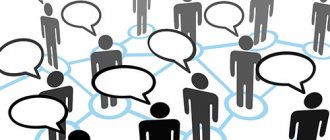Effective communication skills are one of the most important and necessary skills to cope with any life situation. Your likelihood of achieving success at work and in the community, earning the respect of your friends and family, children, spouse, boss or co-workers all depends on how effectively you communicate.
Half of what people usually try to communicate to others is lost in the process of translation and interpretation. What you are trying to say may not always be understood correctly by the listener, and this can lead to misunderstandings.
Although many people admit to being ineffective at communicating, each of us can develop effective communication skills over time through practice. Such communication is usually more spontaneous rather than staged or pre-rehearsed, since in this case the speech appears more emotional and convincing.
“Words are the most powerful force available to humanity. We can use this power constructively, using words of encouragement, or destructively, using words of despair. Words have energy and power that can help, hinder, hurt, harm, offend and humiliate.”
-Winston Churchill
What does effective communication involve?
Effective communication is about conveying information to the right recipient and obtaining the desired feedback through influence and attention. Communication is not only about receiving the information itself, but also about understanding the intentions behind it. The full meaning of the message should be conveyed using all effective communication skills, including oral, nonverbal or written.
Communication is always a two-way process. Feedback and interaction are factors in knowing how successful it has been. Another important aspect of effective communication is listening.
People must be able to not only speak effectively and confidently, but also listen and understand what another person or group of people has to say. Effective communication is necessary to change the behavior of other people, correctly attuning them to perceive something and obtaining information from the interlocutor.
Psychosocial issues such as stress and mood swings are additional factors that affect effective communication. To communicate well, you must always understand your own feelings and emotions.
Rule #9: Show interest
Start a conversation about your interlocutor's hobbies, life and views. Ask clarifying questions, ask for details. People like to talk about themselves more than they like to hear about you. At the same time, it is worth remembering the rules about personal boundaries, compliments and sincerity.
By adhering to the above rules, you can learn to win over new acquaintances and establish successful relationships with others both at work and for personal purposes. And remember, sociability is a learned quality, not an innate one. Practice, believe in yourself and everything will change for the better.
Why is effective communication so important?
Effective communication can build trust, help people understand you better, gain someone's respect, and develop relationships with others. It is necessary to establish reliable contact, as well as to strengthen relationships as needed.
Through effective communication, unnecessary problems in relationships can be avoided. It can be useful in terms of decision making, drawing conclusions and solving problems through interaction in conflict situations. It can also come in handy if you need to communicate something unpleasant. Good relationships with people reduce feelings of stress and anxiety. You will also always have reliable social support.
Working in a team or group of like-minded people also requires effective communication skills. Achieving consensus is only possible through communication between people. You must have the confidence to influence people and make them believe you.
Good communication with family and friends can help you share your problems and feelings with them. Effective communication is essential to developing friendships and connections. You don't need to depend on other people to say things for you if you can do it yourself.
Here are some of the most effective communication skills:
- Listening skills
- Ability to speak briefly
- Ability to show interest
- The ability not to be reprehensible
- Ability to accurately use nonverbal communication
- Observation
- Ability to cope with stress
- Ability to speak clearly and clearly
Psychological barriers to communication
Psychological barriers arise as a result of the individual psychological characteristics of people who enter into the communication process (secrecy, modesty, differences in temperament types), as well as as a result of the characteristics of the relationship between partners (mistrust, antipathy).
Personal aspects become decisive for the emergence of situations of unproductive communication. Due to the fact that each person perceives events and phenomena of the surrounding world subjectively, evaluates them from the point of view of his individual experience, it is sometimes difficult for him to understand a communication partner who has a different point of view and other characteristics of perception. Main types of psychological barriers:
- Aesthetic
barriers - arise in a situation when a person does not like the appearance of the interlocutor. This may concern the features of his appearance, clothing style, and certain wardrobe details. - Intellectual
barriers consist of differences in types of thinking, speed of mental operations and differences in the level of intellectual development. For example, communication between an optimist and a pessimist cannot always be called productive, because one will look for advantages and ways out in any situation, and the second will focus on the negative. An intellectual barrier can be classified as a barrier of incompetence, when a person does not understand the topic under discussion, which causes a feeling of distress or irritation in the communication partner. - Motivational
barriers appear when people have different goals. This leads to misunderstanding and distorted perception of information. - Moral or ethical
barriers - the effectiveness of communication is hampered by the incompatibility of moral positions, principles, and views. - Attitude barrier
- if a person has a negative attitude towards a partner, then his words are not perceived objectively, often with internal protest. It can arise as a result of previous communication experience or based on feedback from other people. - The barrier of negative emotions
or poor physical condition are situational barriers. Sometimes communication problems arise when a person is in a bad mood or state of health and is not in the mood to establish contact with others.
The role of barriers in effective communication and how to overcome them
Communication barriers prevent our messages from reaching the other person's mind or distort them so that they lose their original meaning and message. There are many barriers that can impede effective communication, including physical (distance, noise, etc.), physiological (hearing or speech impairment), sociocultural (cultural differences), semantic (signs and symbols) or, in fact, linguistic.
Other factors that can act as barriers include environment, stress, context, interference, emotional imbalance, lack of interest or focus, inconsistent body language, etc.
Obstacles to effective communication can be overcome through the right means—using shorter sentences, better organizing your message before sending it, training, being empathetic and mindful, avoiding prejudice, information noise, etc.
Communication difficulties: what reasons and factors prevent easy communication with people? (2 photos)
1. Excessive absorption in oneself and one’s problems. This is a fairly common situation. It is logical that no one will want to communicate with an interlocutor who constantly, as they say, pulls the blanket over himself and talks only about his own affairs, achievements, successes, problems.
2. Categorical. Excessive rigidity and unwillingness to accept the interlocutor’s point of view are possible. But only in certain important cases. Otherwise, arguing for the sake of arguing is a road to nowhere.
3. Uncertainty. Even the most confident people can have complexes. Excessive shyness, limited vocabulary, problems with diction and other factors can cause difficulties when communicating with unfamiliar and strangers.
4. Misunderstanding. Lack of desire to understand the reason for the conversation, its essence, the problem is one of the most common factors that impede dialogue. At the same time, interlocutors more often ignore the problem than try to solve it. A language barrier, rejection of hierarchical relationships, unwillingness or inability to understand verbal signs - body language, gestures, facial expressions - can lead to conflict.
5. Fear. If a person was once interrupted during a dialogue, he may consciously or subconsciously fear a repetition of the situation and experience difficulties in communication because of this.
6. Rejection. It also happens that a person, in fact, does not have any problems, complexes or blocks. It’s just that the interlocutor causes disgust because of his appearance, behavioral characteristics or established reputation.
7. Lack of interest. As well as its excess, it can pose a serious obstacle to conversation. Excessive interest in a person may cause him to suspect that they want to use him. And the lack of interest will lead to its mutual attenuation on the other side.
8. Self-esteem problems. The causes of both high and low self-esteem should be sought in childhood. People with low self-esteem lack a clear understanding of their own self-image, strengths and weaknesses. This gives rise to a lot of contradictions and self-doubts. This interferes with defending your opinion and protecting your interests. Even when aiming for success, people with low self-esteem are obviously prepared for failure and expect it. In an attempt to protect themselves, they try to be invisible, often missing out on a lot of opportunities and prospects. The second side of the coin is inflated self-esteem. Such people consider themselves the center of the universe, an ideal, a standard. And when communicating with others, they show disdain. They seem to tell the interlocutor and the world that if something does not suit someone, then everyone can be free, he will not strain himself. Individuals with high self-esteem, when communicating, exalt their own merits in every possible way and belittle the merits of others. And this also creates difficulties when interacting with society.
Verbal and non-verbal communication
Effective communication involves both verbal and non-verbal communication. Your body language communicates your intentions just as well as your words. Nonverbal signs sometimes speak more sincerely than the words themselves. Facial expression, hand movements, eye contact, posture, intonation - these are all things people pay attention to when you speak. In the same way, you should pay attention to this when you follow the speech of your interlocutor.
Many people find it difficult to start a conversation, and some don't know how to keep it going once it's started. Social phobia is quite common. Confident communication is not easy, but you must learn to defend your position in front of your interlocutors. If what you say doesn't reach people and doesn't connect with them, then it's unlikely to lead you to success.
Useful tool Board game “Influence Roulette”
This business game will teach players how to persuade and influence anyone in any social situation. Find out the details
A few little secrets
Big Secrets are the foundation. But there are a few more small but very important secrets, without which it will be difficult to establish successful communication with others. Some of them are purely technical in nature, others complement and clarify individual Big Secrets.
- Make communication with you pleasant. A meeting with you or a phone call should bring positive things to people. Give compliments, show your joy from meeting the person.
- Respect other people's time and plans. Before you start a conversation, check whether your interlocutor can give you time right now. And don’t be offended if he makes it clear that it’s better to postpone the conversation to another time.
- Improve your speech. Nobody likes interlocutors who cannot speak clearly, who mutter, hastily swallow the endings of words and sentences, and jump from one thought to another.
- Smile at your interlocutor. But don’t forget to make sure your smile is beautiful: keep your teeth healthy and your breath fresh.
- Avoid offensive language. The Russian language is so rich that it allows you to speak expressively about everything without using obscene language. Purity of speech inspires respect.
- Avoid jargon and the use of highly specialized terminology. People don't like to feel incompetent.
- Do not overuse witticisms and anecdotes, especially those with a beard. It's tiring.
- The rules of good manners recommend avoiding disputes about religion, nationality and politics in unfamiliar company. Any discussions in a raised voice, the desire to certainly have the last word for yourself, to prove that you are right, can make you a persona non grata.
- Expand your horizons. This will help support any topics raised by the interlocutor.
- Do not express sharply negative judgments. Any of them can be replaced with a more restrained and tactful one. This will reduce the risk of accidentally offending your interlocutor, and will not harm you in any way.
Doesn't seem like anything special, right? Try it, it's not difficult. And both you and those around you will like the result.
Most of the results of our work directly depend on a person’s ability to establish contacts. Communication skills truly solve most problems, provide choice, and open up new opportunities. What do you need to work on to make communication successful? Can everyone develop good communication skills?
Psycho-social and environmental factors in effective communication
Effective communication is the ability to appropriately address another person's social and cultural background. If the social and cultural background of the interlocutors is different, their messages will not be interpreted properly, since the social reality of both will be at different levels.
Context or environment also influences the effectiveness of communication as people should not laugh when someone is crying. The position should always complement the situation. Effective communication is when social, cultural or environmental factors are used to influence people and convey clear messages to them.
Why do we need communications?
Once upon a time, about ten years ago, I heard a phrase at a personal growth training that “everything comes to us through people”... love, money, good ideas, and much more. Therefore, you need to build communications with a real person, and not with a telephone. Even if the first communication took place over the phone, it is worth meeting this person after a while and chatting with him “live.” This is the advice that the coach gave us at the training and which I still use to this day!
Although now you can often meet married couples in cafes and just couples sitting at the table, each with their head buried in their phones... You can’t help but ask the question: “Why did they come here?”
I always remember family dinners in France, where people don’t just gather to eat, they come to socialize... As a rule, they have long dinners and this is a good family tradition!
Effective and ineffective communication
- You think so? – asked the March hare.
“Yes, I think so,” answered Alice. - That is, it seems to me that I’ll guess if I can. But it's the same thing.
“Of course, it’s not the same thing,” shouted the Hatter. – Is it the same thing to say: “I see everything I eat” or “I eat everything I see?”
"Alice in Wonderland", Lewis Carroll
In this dialogue you can see an example of effective and ineffective communication. If a message is interpreted differently than expected, it can be considered ineffective. Saying what someone means and meaning what someone says are two completely different things. Such messages create confusion and misunderstanding.
Thus, learning effective communication skills is an extremely important step in the life of every person.
Communication barriers
Communication barriers arise if there is a mismatch in vocabulary between interlocutors. This group also includes problems associated with the lack of analogies of concepts in different languages and other translation difficulties. Main types of communication barriers:
- Semantic
barriers arise when communication partners mean different things by similar concepts. For example, one person understands the phrase “a good method of achieving a goal” as a method that will not harm the people around him, while another understands it as a strategy to achieve what he wants at any cost, even if those around him suffer. - Logical
barriers - appear if a person does not know how to clearly and consistently express his thoughts. In such a dialogue, cause-and-effect relationships are broken, and concepts are often substituted. - Phonetic
barriers are a speaker's poor speaking technique. When words sound unclear and unclear, which makes it difficult to perceive information.
Successful communication is a skill
To build a relationship with a client, you need to win him over, build a “trusting” relationship and, of course, provide him with the service he needs. Marketers use “seven approaches,” and sometimes more, to build successful communications. What about in everyday life?
On the subject: By what qualities and signs can one recognize a good person?
How to build successful communication with loved ones?
Inner circle. Who goes there? Grandparents, parents, children, husbands/wives. These are the closest people. And the most difficult thing is to build successful communication with them. Many broken destinies and mental traumas. The reason for all this is that we violate both our personal boundaries and the personal boundaries of our loved ones.
How to develop communication skills?
All of the above once again convinces us that communication is not only the ability to hear and listen, but also to understand what we say and how we do it.
For example, if I’m in a “bad mood,” then my friends very sensitively track this by my voice, even on the phone, although I don’t show it. But, apparently, subconsciously, non-verbally, this is somehow conveyed to the interlocutor, and they always ask: “What happened to you?”
There are exercises that are easy to learn to communicate correctly.
So Doctor of Psychology, Professor, Rector of the University of Practical Psychology Nikolai Ivanovich Kozlov advises:
- Build communication “as equals”, not from a “top-down” position
- The more people you communicate with, the easier it will be for you to learn how to communicate. You will hone your communication skills only by communicating with a variety of different types of personalities.
- Always be open and friendly in communication!
Advice . I would like to add that honesty in communication always wins you over and inspires trust. Without trust, it is difficult to build successful communication!










